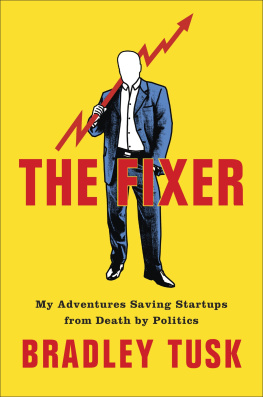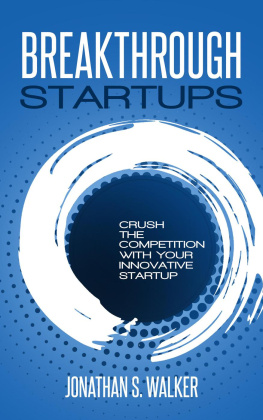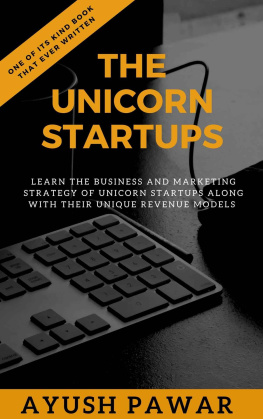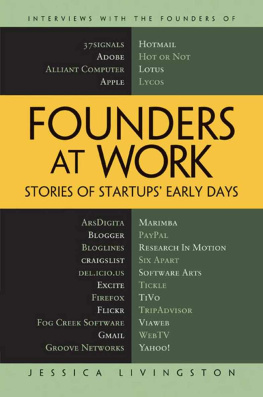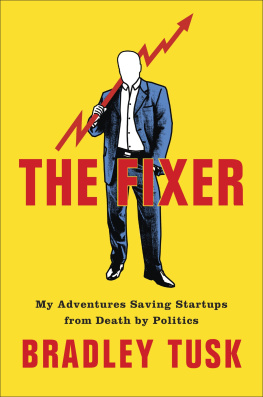Penguin supports copyright. Copyright fuels creativity, encourages diverse voices, promotes free speech, and creates a vibrant culture. Thank you for buying an authorized edition of this book and for complying with copyright laws by not reproducing, scanning, or distributing any part of it in any form without permission. You are supporting writers and allowing Penguin to continue to publish books for every reader.
Names: Tusk, Bradley, author.
Title: The fixer : my adventures saving startups from death by politics / Bradley Tusk.
Description: New York City : Portfolio, 2018.
Identifiers: LCCN 2018015642 | ISBN 9780525536499 (hardback) | ISBN 9780525536505 (ebook)
Subjects: LCSH: New business enterprises. | New business enterprisesGovernment policy. | New business enterprisesLaw and legislation. | BISAC: BUSINESS & ECONOMICS / Government & Business. | POLITICAL SCIENCE / Public Policy / Economic Policy. | BUSINESS & ECONOMICS / New Business Enterprises.
Penguin is committed to publishing works of quality and integrity. In that spirit, we are proud to offer this book to our readers; however, the story, the experiences, and the words are the authors alone.
1
Turns Out You Can Fight City Hall
DallasFort Worth airport is a fairly miserable place to be on a good day. When its raining cats and dogs and flights to LaGuardia are being wiped off the board, DFW is a solid contender for the ninth circle of hell. I was sitting at a United gate, hoping for a standby seat on the one flight to New York not yet canceled. My phone lit up. Travis.
Travis Kalanick, at the time, was the cofounder and CEO of Uber. We had been working together since 2011, fighting off attempts by the taxi industry to prevent ridesharing from existingTravis in his role as CEO and me as the founder and CEO of Tusk Strategies, a political consulting firm based in New York. Wed managed, so far, to keep taxis at bay and break into every market in the United States. But all of a sudden, in the summer of 2015, we found ourselves facing a new front in the war.
You see what de Blasio just did?
No. Im stuck at DFW. Whatd he do this time?
Announced he wants to cap our growth at one percent a year. Basically kills the business. Go check it out online and call me back.
I did some quick research. Politico, the Daily News, and the Times all had stories. Travis was right. (Id been hoping he was exaggerating.) Bill de Blasio, New York Citys mayor, had just proposed legislation that would kill Ubers growth and operations. De Blasio had been in office for around eighteen months and, at that point, exerted full and complete control over the fifty-one-member city council whod be voting on Ubers future. He hated technology, hated business, hated the private sector, and was as responsive to the whims and needs of his campaign donors (in this case, the taxi medallion owners) as the city council was to his. Not a good dynamic.
Two minutes later, Travis and I talked again.
This is bad, I told him.
No shit. If it happens in New York, the whole world is going to see it. Which means it could happen anywhere. We cant let that happen.
Travis, a close city council vote is 492; 483 is considered a nail-biter. We need twenty-six votes to beat this. Theres a reason they say you cant fight city hall.
Then figure out how to get us twenty-six votes.
Okay. I paused, thinking. Two questions: How much can I spend and is there any argument I cant use?
Whatever you need.
My mind started spinning with possibilities. The flight, miraculously, started boarding and, even more miraculously, I got off the standby list and onto the plane. Middle seat in the row right next to the bathroom, but at least I was heading homewith a pretty big problem to figure out before I got there.
It may seem hard to imagine today, when to Uber somewhere has become a verb, but Uber wasnt always inevitable. As a fledgling startup attempting to disrupt the taxi industry, it faced challenges from regulators left and right. Labor hated it because it was impossible to control, much less organize, thousands of freelance contractors. The taxi industry hated it because it took only one on-demand, seamlessly transacted Uber ride for customers to switch their loyalty forever. Politicians across the country hated it because Ubers success just meant being screamed at by their donors in the taxi industry.
The stakes were high. If Uber was unable to operate freely in Americas most important financial and cultural center, it was almost a precedent for legislators all over the world to shut us down. We were fucked without New Yorkthere was no way to justify Ubers high valuation, its investors lofty expectations, and its promises of changing the way people get around if we couldnt freely operate in the worlds most visible city.
As I sat there on the tarmac waiting for takeoff, I thought hard about the man standing between us and Ubers future. Bill de Blasio became mayor of New York City in 2013 by portraying himself as a champion of the left, as the antagonist of income inequality, as the hero of people of color. He structured every fight, every policy, every issue as de Blasio, champion of the oppressed versus big, bad corporation. The politics worked well for him, since it forced virtually every union, newspaper, pundit, political influencer, and everyone else in the system to take his side or risk being thrown out of the progressive mafia. His play was clearly going to be de Blasio defending poor taxi drivers against the big, bad, multibillion-dollar Uber. And that play had a very good chance of success.
We had to come up with a different story.
I thought hard about de Blasios pain points. He wasnt acting from an honest place of belief or ideologyjust cold, hard, pay-to-play politics. But that was true of virtually every mayor in every city. Voters were used to it.
Somewhere over the Ozarks, the answer hit me. De Blasio had a weaknessone he was dangerously unaware of. No one had tried pressing that weakness before, but if it worked, it could upend all of the conventional wisdom, including that centuries-old adage about not being able to fight city hall. Sure, it would be an uphill political battlerisky and possibly costing Uber an embarrassing loss on a global stage. But it was our only shot.
Confession: Uphill political fights are kind of my thing. I learned how to handle them by working in government and politics for more than two decades for the good, the bad, and the ugly. I ran Mike Bloombergs New York mayoral campaign in 2009 and worked for him at city hall during his first term. I spent two years on Capitol Hill as Chuck Schumers communications director, learning how to move the media at the feet of the most press-hungry and media-savvy politician in America. I spent four insane years as deputy governor of Illinois. The upside was that I got to run the fifth-biggest state in the nationrun its $60 billion budget, all state operations, oversee all seventy thousand state employees, all policy decisions, all legislation, and all communicationsat the ripe age of twenty-nine. The downside was my boss was Rod Blagojevich. And along the way, I worked for local political legends like Henry Stern, New York Citys longtime zany and brilliant parks commissioner, and Ed Rendell, during his tenure as mayor of Philadelphia, and had a front-row seat to the heroic efforts of people like Rudy Giuliani, Chuck Schumer, Hillary Clinton, and Mike Bloomberg to rebuild New York City in the aftermath of 9/11.

